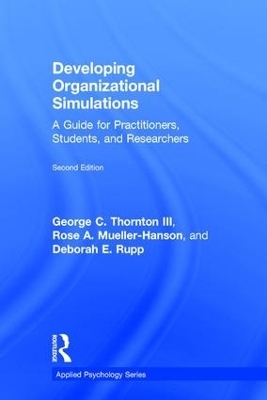
Developing Organizational Simulations
Routledge (Verlag)
978-1-138-11924-6 (ISBN)
This second edition of Developing Organizational Simulations provides a concise source of information on effective and practical methods for constructing simulation exercises for the assessment of psychological characteristics relevant to effectiveness in work organizations. Incorporating new additions such as the multiple ways technology can be used in the design, delivery, scoring, and evaluating of simulation exercises, as well as the delivery of feedback based on the results, this book is user-friendly with practical how-to guidance, including many graphics, boxes, and examples. This book is ideal for practitioners, consultants, HR specialists, students, and researchers in need of guidance developing organizational simulations for personnel selection, promotion, diagnosis, training, or research. It is also suited for courses, workshops, and training programs in testing and measurement, personnel selection, training and development, and research methodology.
George C. Thornton III is Professor Emeritus of Psychology at Colorado State University, USA. He specializes in assessment centers and implications of employment discrimination law for personnel psychology. He is the lead author of Assessment Center Perspectives for Talent Management Strategies. Rose A. Mueller-Hanson is Associate Director/CFO at Community Interface Services, USA. She specializes in developing and implementing talent management programs and has published numerous articles and given presentations on a variety of talent management topics. Deborah E. Rupp is Professor and William C. Byham Chair in Industrial-Organizational Psychology at Purdue University, USA. She specializes in the psychometric, technological, cross-cultural, legal, and ethical issues inherent in workplace behavioral assessment. She also consults and conducts research in the areas of organizational justice/ethics, corporate social responsibility, and humanitarian work psychology.
Part I: Concepts and Principles 1. Simulations in Context 2. Developing Simulations Step by Step 3. Theories, Principles, and Conceptual Frameworks Relevant for Constructing Simulations 4. General Issues and Specific Tips for Constructing Simulations 5. Technology and Simulations Part II: Categories and Types of Simulations 6. Individual Interpersonal Simulations 7. Individual Information Simulations 8. Intra-Group Simulations 9. Inter-Group Simulations 10. Simulations Involving Physical Activities 11. Low-Fidelity Simulations 12. Integrated Simulations: A "Day-in-the-Life" Part III: Implementation and Evaluation 13. Choosing and Training Assessors, Role Players, Administrators, Feedback Providers/Coaches, and Technical Support Persons 14. Demonstrating the Value of Simulations 15. Ensuring Simulations are Compliant with Statutes, Regulations, Standards, and Guidelines 16. Summary and Conclusions Regarding Organizational Simulations
| Erscheinungsdatum | 15.07.2017 |
|---|---|
| Reihe/Serie | Applied Psychology Series |
| Zusatzinfo | 57 Tables, black and white |
| Verlagsort | London |
| Sprache | englisch |
| Maße | 152 x 229 mm |
| Gewicht | 498 g |
| Themenwelt | Geisteswissenschaften ► Psychologie ► Allgemeine Psychologie |
| Geisteswissenschaften ► Psychologie ► Arbeits- und Organisationspsychologie | |
| Wirtschaft ► Betriebswirtschaft / Management ► Personalwesen | |
| Wirtschaft ► Volkswirtschaftslehre | |
| ISBN-10 | 1-138-11924-5 / 1138119245 |
| ISBN-13 | 978-1-138-11924-6 / 9781138119246 |
| Zustand | Neuware |
| Haben Sie eine Frage zum Produkt? |
aus dem Bereich


